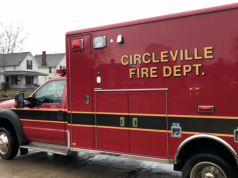Submitted

ASHLAND – Jason Beavers, a teacher at Logan Elm High School, was recently recognized for his contribution to a new educational website designed to help teachers, students and others better understand the role that religion has played in American history and politics.
The site is a project of the Ashbrook Center at Ashland University, which offers educational programs for secondary school teachers, including the only master’s degree designed specifically for history, civics and government teachers. Rather than rely primarily on textbooks, Ashbrook’s programs use original historical documents as their primary teaching tools.
“There seems to be nothing more divisive in American politics these days than religion,” said Dr. David Tucker, Earhart Senior Fellow at the Ashbrook Center. “You can’t turn on the TV or open a newspaper without being confronted by a variety of highly charged stories.”
Tucker also is the associate director of Ashbrook’s Master of Arts in American History and Government (MAHG) program and co-creator of the website with Sarah Morgan Smith, a MAHG graduate and current Ph.D. candidate at Rutgers.
“Teachers know they cannot ignore the topic, since religion has figured prominently in our history,” Tucker said. “But they also know they need to address it in a way that is appropriate. We wanted to help them with this. We also needed them to help us, which is why MAHG students and alumni played a major role in creating the site.”
They did this during two summer seminars that focused specifically on religion in history. The first seminar, which included 15 teachers from the MAHG program, took place in Newport, Rhode Island, at the visitor’s center of Touro Synagogue, the oldest Jewish house of worship in the United States. The seminar coincided with the 225th anniversary of George Washington’s famous “Letter to the Hebrew Congregation of Newport, Rhode Island.” The letter responded to the implicit question: Would the new federal government respect the Jews’ freedom to worship? -with a beautiful letter guaranteeing freedom of conscience.
The second seminar, held at Ashland University, focused on religion, civic virtue and liberty. It was during this session that the teachers began to research particular topics for inclusion on the Religion in America website.
A number of products emerged from the seminars and subsequent research and discussions, including an e-book featuring “25 Core Documents” that are essential reading if an individual wants to develop a broad understanding of religion’s role in U.S. history and politics.
In the months ahead additional information and exhibits will be added, including:
- other volumes of documents for deeper study on topics such as key court decisions affecting religion in America;
- a virtual exhibit highlighting U.S. historic sites with religious significance, along with related documents and images;
- a chart depicting key events and dates related to religious establishment/ disestablishment in the colonial and Founding eras;
- excerpted videos and transcripts from MAHG webinars on religion in U.S. history and politics;
- a section on religion and literature, and
- interviews with scholars on Islam in America.
Many of the specific additions were proposed by the teachers on the website development team.
“The process,” Tucker said, “will be ongoing and will continue to include teacher involvement, which we see as essential to the site’s success.”
The website was made possible through generous funding support from the Diehl Family Foundation, the William H. Donner Foundation and Ambassador John L. Loeb.
This article originally appeared on The Pickaway News Journal









